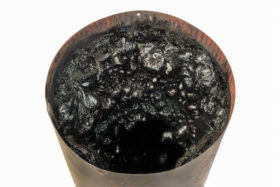What is Creosote and What does it do to Your Chimney
When it comes to chimney maintenance, creosote gets a lot of attention. You probably know that one of your chimney sweep’s primary goals is to remove creosote from your
What is creosote?
Very simply, creosote is a byproduct of wood burning in your fireplace. You know that your fire produces smoke, which travels up your chimney. As that smoke makes its way through your chimney, it cools and causes condensation on the walls of your chimney flue. That condensation hardens and forms creosote. Creosote is dark brown or black. It can be sticky and tarlike or shiny and smooth.
What is glazed creosote?
There are several circumstances that can allow thick, hardened creosote deposits, called glazed creosote, to build up on the walls of your flue. An improperly sized chimney flue, an improperly installed fireplace or woodstove or burning improperly seasoned firewood can cause a buildup of glazed creosote.
What does creosote do to your chimney?
The primary concern with creosote is that it is highly flammable and can cause a fire hazard within your chimney. If creosote is allowed to build up unchecked on the walls of your chimney, it can ignite and cause a dangerous and damaging chimney fire. Even without igniting, creosote can cause problems within your flue. Creosote is acidic and can eat away at the lining on your flue. If creosote is allowed to build up too thickly within your chimney, it can prevent smoke and carbon monoxide from exiting your chimney flue, forcing dangerous smoke and gases back into your home. Creosote also can cause an unpleasant smell to fill your home, particularly during hot summer months.
How do you protect your chimney from creosote?
A chimney sweeping removes creosote from your chimney and dramatically reduces your risk of a chimney fire. When glazed creosote has caked a chimney flue, a standard chimney sweeping with rotating brushes will not remove the creosote deposits. In those cases, a special chemical agent must be used to remove the glazed creosote.
How can you prevent creosote buildup?
There are some ways to help reduce the buildup of creosote with your chimney flue. Always make sure that you burn properly seasoned firewood in your fireplace or woodstove. Never partially close the fireplace doors on your open-hearth fireplace, and make sure that your damper is fully open when you have a fireplace burning within your fireplace.
To protect your chimney from the dangers of creosote, your chimney should be swept and inspected before each fire-burning season by a certified chimney sweep. If you haven’t had your chimney swept and inspected this year, call Your Chimney Sweep to schedule an appointment today! In addition to providing traditional chimney sweeping, we remove glazed creosote to keep your chimney functioning safely.

